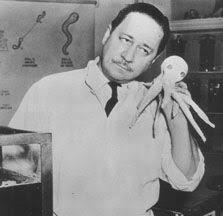(We've been out of town, and so, here's a reprint of one of the classic works on how to write, by the master, Robert Benchley.)
Robert Benchley, “How to Get Things Done”
from Chips off the Old Benchley ©1949
A great many people have come up to me and asked me how I manage to get so much work done and still keep looking so dissipated. My answer is "Don't you wish you knew?" and a pretty good answer it is, too, when you consider that nine times out of ten I didn't hear the original question.

But the fact remains that hundreds of thousands of people throughout the country are wondering how I have time to do all my painting, engineering, writing and philanthropic work when, according to the rotogravure sections and society notes, I spend all my time riding to hounds, going to fancy-dress balls disguised as Louis XIV or spelling out
GREETINGS TO CALIFORNIA in formation with three thousand Los Angeles school children. "All work and all play," they say.
The secret of my incredible energy and efficiency in getting work done is a simple one. I have based it very deliberately on a well-known psychological principle and have refined it so that it is now almost too refined. I shall have to begin coarsening it up again pretty soon.
The psychological principle in this: anyone can do any amount of work, provided it isn't the work he is supposed to be doing at that moment.
Let us see how this works out in practice. Let us say that I have five things which have to be done before the end of the week: (1) a basketful of letters to be answered, some of them dating from October, 1928 (2) some bookshelves to be put up and arranged with books (3) a hair-cut to get (4) a pile of scientific magazines to go through and clip (I am collecting all references to tropical fish that I can find, with the idea of some day buying myself one) and (5) an article to write for this paper.
Now. With these five tasks staring me in the face on Monday morning, it is little wonder that I go right back to bed as soon as I have had breakfast, in order to store up health and strength for the almost superhuman expenditure of energy that is to come. Mens sana in corpore sano is my motto, and, not even to be funny, am I going to make believe that I don't know what the Latin means. I feel that the least that I can do is to treat my body right when it has to supply fuel for an insatiable mind like mine.
As I lie in bed on Monday morning storing up strength, I make out a schedule. "What do I have to do first?" I ask myself. Well, those letters really should be answered and the pile of scientific magazines should be clipped. And here is where my secret process comes in. Instead of putting them first on the list of things which have to be done, I put them last. I practice a little deception on myself and say: "First you must write that article for the newspaper." I even say this out loud (being careful that nobody hears me, otherwise they would
[Pg 253] keep me in bed) and try to fool myself into really believing that I must do the article that day and that the other things can wait. I sometimes go so far in this self-deception as to make out a list in pencil, with "No. 1. Newspaper article" underlined in red. (The underlining in red is rather difficult, as there is never a red pencil on the table beside the bed, unless I have taken one to bed with me on Sunday night.)
Then, when everything is lined up, I bound out of bed and have lunch. I find that a good, heavy lunch, with some sort of glutinous dessert, is good preparation for the day's work as it keeps one from getting nervous and excitable. We workers must keep cool and calm, otherwise we would just throw away our time in jumping about and fidgeting.
I then seat myself at my desk with my typewriter before me and sharpen five pencils. (The sharp pencils are for poking holes in the desk-blotter, and a pencil has to be pretty sharp to do that. I find that I can't get more than six holes out of one pencil.) Following this I say to myself (again out loud, if it is practical) "Now, old man! Get at this article!"
Gradually the scheme begins to work. My eye catches the pile of magazines, which I have artfully placed on a near-by table beforehand. I write my name and address at the top of the sheet of paper in the typewriter and then sink back. The magazines being within reach (also part of the plot) I look to see if anyone is watching me and get one off the top of the pile. Hello, what's this! In the very first one is an article by Dr. William Beebe, illustrated by horrifying photographs! Pushing my chair away from my desk, I am soon hard at work clipping.

One of the interesting things about the Argyopelius, or
[Pg 254] "Silver Hatchet" fish, I find, is that it has eyes in its wrists. I would have been sufficiently surprised just to find out that a fish had wrists, but to learn that it has eyes in them is a discovery so astounding that I am hardly able to cut out the picture. What a lot one learns simply by thumbing through the illustrated weeklies! It is hard work, though, and many a weaker spirit would give it up half-done, but when there is something else of "more importance" to be finished (you see, I still keep up the deception, letting myself go on thinking that the newspaper article is of more importance) no work is too hard or too onerous to keep one busy.
Thus, before the afternoon is half over, I have gone through the scientific magazines and have a neat pile of clippings (including one of a Viper Fish which I wish you could see. You would die laughing). Then it is back to the grind of the newspaper article.
This time I get as far as the title, which I write down with considerable satisfaction until I find that I have misspelled one word terribly, so that the whole sheet of paper has to come out and a fresh one be inserted. As I am doing this, my eye catches the basket of letters.
Now, if there is one thing that I hate to do (and there is, you may be sure) it is to write letters. But somehow, with the magazine article before me waiting to be done, I am seized with an epistolary fervor which amounts to a craving, and I slyly sneak the first of the unanswered letters out of the basket. I figure out in my mind that I will get more into the swing of writing the article if I practice a little on a few letters. This first one, anyway, I really must answer. True, it is from a friend in Antwerp asking me to look him up when I
[Pg 255] am in Europe in the summer of 1929, so he can't actually be watching the incoming boats for an answer, but I owe something to politeness after all. So instead of putting a fresh sheet of copy-paper into the typewriter, I slip in one of my handsome bits of personal stationary and dash off a note to my friend in Antwerp. Then, being well in the letter-writing mood, I clean up the entire batch. I feel a little guilty about the article, but the pile of freshly stamped envelopes and the neat bundle of clippings on tropical fish do much to salve my conscience. Tomorrow I will do the article, and no fooling this time either.
When tomorrow comes I am up with one of the older and more sluggish larks. A fresh sheet of copy-paper in the machine, and my name and address neatly printed at the top, and all before eleven A. M.! "A human dynamo" is the name I think up for myself. I have decided to write something about snake-charming and am already more than satisfied with the title "These Snake-Charming People." But, in order to write about snake-charming, one has to know a little about its history, and where should one go to find history but to a book? Maybe in that pile of books in the corner is one on snake-charming! Nobody could point the finger of scorn at me if I went over to those books for the avowed purpose of research work for the matter at hand. No writer could be supposed to carry all that information in his head.

So, with a perfectly clear conscience, I leave my desk for a few minutes and begin glancing over the titles of the books. Of course, it is difficult to find any book, much less one on snake-charming, in a pile which has been standing in the corner for weeks. What really is needed is for them to be on a
[Pg 257] shelf where their titles will be visible at a glance. And there is the shelf, standing beside the pile of books! It seems almost like a divine command written in the sky: "If you want to finish that article, first put up the shelf and arrange the books on it!" Nothing could be clearer or more logical.
In order to put up the shelf, the laws of physics have decreed that there must be nails, a hammer and some sort of brackets to hold it up on the wall. You can't just wet a shelf with your tongue and stick it up. And, as there are no nails or brackets in the house (or, if there are, they are probably hidden somewhere) the next thing to do is to put on my hat and go out to buy them. Much as it disturbs me to put off the actual start of the article, I feel that I am doing only what is in the line of duty to put on my hat and go out to buy nails and brackets. And, as I put on my hat, I realize to my chagrin that I need a hair-cut badly. I can kill two birds with one stone, or at least with two, and stop in at the barber's on the way back. I will feel all the more like writing after a turn in the fresh air. Any doctor would tell me that.
So in a few hours I return, spick and span and smelling of lilac, bearing nails, brackets, the evening papers and some crackers and peanut butter. Then it's ho! for a quick snack and a glance through the evening papers (there might be something in them which would alter what I was going to write about snake-charming) and in no time at all the shelf is up, slightly crooked but up, and the books are arranged in a neat row in alphabetical order and all ready for almost instantaneous reference. There does not happen to be one on snake-charming among them, but there is a very interesting one containing some Hogarth prints and one which will bear even
[Pg 258] closer inspection dealing with the growth of the Motion Picture, illustrated with "stills" from famous productions. A really remarkable industry, the motion-pictures. I might want to write an article on it sometime. Not today, probably, for it is six o'clock and there is still the one on snake-charming to finish up first. Tomorrow morning sharp!
Yes, sir!

And so, you see, in two days I have done four of the things I had to do, simply by making believe that it was the fifth that I
must do. And the next day, I fix up something else, like taking down the bookshelf and putting it somewhere else, that I
have to do, and then I get the fifth one done.
The only trouble is that, at this rate, I will soon run out of things to do, and will be forced to get at that newspaper article the first thing Monday morning.
THE END












 This has been an awful week for me personally. After hearing about the death of always creative and funny icon Robin Williams and all that sadness entailed, we hear about the death of the beautiful Lauren Bacall. Of course, there was a big difference. Age for one thing, Betty Bacall was eighty-nine years old and had lived a full and I imagine a reasonably happy life. Her great love was Humphrey Bogart and by all accounts their marriage was happy and fulfilling. Although it was cut short by his early death.
This has been an awful week for me personally. After hearing about the death of always creative and funny icon Robin Williams and all that sadness entailed, we hear about the death of the beautiful Lauren Bacall. Of course, there was a big difference. Age for one thing, Betty Bacall was eighty-nine years old and had lived a full and I imagine a reasonably happy life. Her great love was Humphrey Bogart and by all accounts their marriage was happy and fulfilling. Although it was cut short by his early death.



















